Effective Ways to Relieve Mosquito Bite Itching
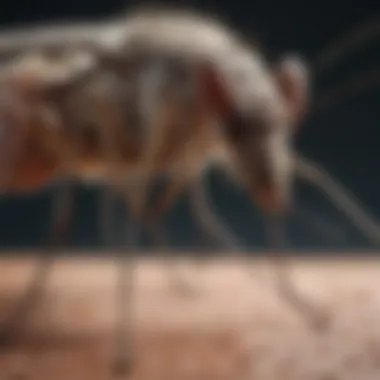
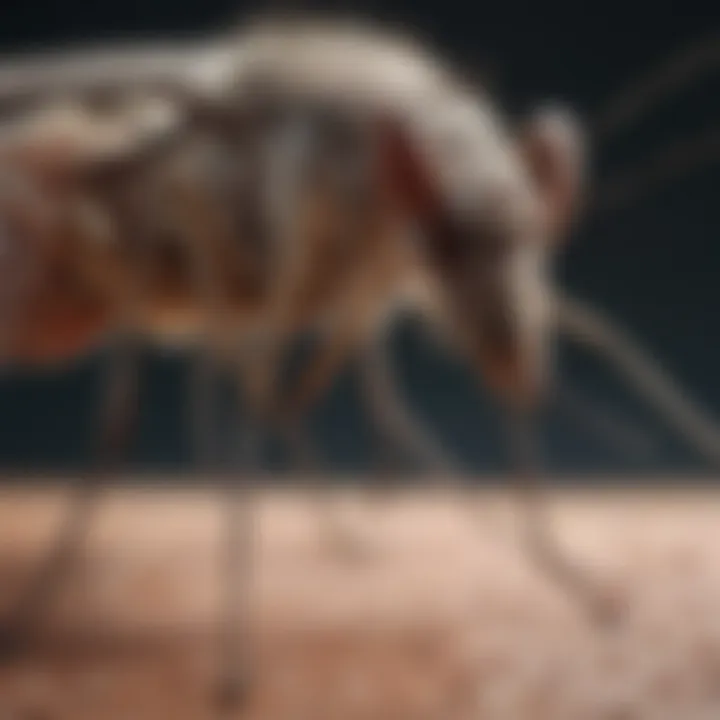
Intro
Mosquito bites can be more than just an annoyance; they can disrupt outdoor fun and leave a lasting mark, both physically and mentally. Understanding the root causes of the itching sensation, alongside preventive strategies and remedies, can make a world of difference. In this article, we’ll delve into the intricate biology behind mosquito bites, explore conventional and alternative methods for relief, and offer practical tips to keep those pesky insects at bay.
Key Takeaways
- The Itch Mechanism: When a mosquito bites, it injects saliva containing anticoagulants into the skin, prompting an immune response that results in itching and swelling. Understanding this biological reaction is essential for effective management.
- Effective Remedies: Various remedies exist to ease the discomfort of mosquito bites, ranging from over-the-counter antihistamines to natural alternatives like aloe vera and tea tree oil.
- Preventive Measures: Preventing bites involves environmental awareness and personal habits, such as wearing protective clothing and using insect repellent, particularly in high-risk areas like wetlands or dense forests.
- Statistics to Consider: According to the World Health Organization, mosquitoes are responsible for spreading diseases that affect millions globally, making effective mosquito management not just a matter of comfort, but also health.
Practical Tips
Actionable Steps for Relief
- Cold Compress: Apply a cold compress directly to the bite. This helps with swelling and numbs the itch.
- Topical Treatments: Use over-the-counter creams or ointments that contain hydrocortisone or calamine lotion to reduce itching and inflammation.
- Natural Remedies: Try applying a dab of honey or a slice of onion—both can provide relief through their natural properties.
- Antihistamines: Consider taking oral antihistamines if the itching persists. They can effectively counter the allergic reaction triggered by the bite.
Suggested Routines for Prevention
- Wardrobe Choices: When heading outdoors, choose long sleeves and pants. Light-colored clothing can deter mosquitoes, as they are drawn to dark hues.
- Repellent Application: Use insect repellent that contains DEET or picaridin, especially if spending time in wooded or wet areas.
- Limit Standing Water: Mosquitoes breed in stagnant water. Make sure to empty containers that hold water around your home.
"An ounce of prevention is worth a pound of cure." - Benjamin Franklin
Whether you’re a health professional or simply someone who enjoys spending time outside, taking the time to understand mosquito bites and how to manage them can enhance your well-being and overall enjoyment of the great outdoors.
Understanding Mosquito Bites
Mosquito bites are more than just a pesky irritation; they hold significant implications for our health and comfort. Understanding the nuances of mosquito bites is crucial, since these little nuisances can lead to various health issues, ranging from mild discomfort to serious diseases like West Nile virus or Zika. By grasping the core elements of mosquito behavior and bites, individuals can take informed steps to mitigate their impact.
Being aware of certain factors can significantly affect one’s quality of life during warmer months when mosquitoes thrive. Understanding how the mosquito life cycle influences their presence can help in strategizing effective preventive measures. Moreover, recognizing personal allergic reactions toward mosquito saliva can assist in tailoring a response to treatments and remedies.
The Life Cycle of Mosquitoes
To grasp why mosquitoes are such relentless biters, one must first familiarize themselves with their life cycle. A mosquito's development can be broken down into four key stages: egg, larva, pupa, and adult.
- Egg: Female mosquitoes lay hundreds of eggs on or near water sources. These eggs can withstand drying out, hatching in favorable conditions.
- Larva: Once the eggs hatch, larvae emerge and spend their time swimming in water, feeding on organic material. This is crucial for growth.
- Pupa: After a larval stage, mosquitoes transition into pupae. This stage is non-feeding and acts as a transitional phase into adulthood.
- Adult: Adult mosquitoes emerge from the pupal case, ready to mate and begin the cycle anew. Females require a blood meal for developing eggs, making them more prone to bite.
Understanding this cycle enlightens the preventive tactics. Reducing standing water can deter larvae, ultimately reducing the adult population.
Why Mosquitoes Bite
Mosquitoes bite mainly for reproduction. It’s the female mosquitoes that seek blood, needing the proteins and iron found in it to develop their eggs. But why they choose some humans over others is an intricate dance of several factors, including:
- Carbon Dioxide: Mosquitoes have a keen sense for carbon dioxide emitted during exhalation, leading them to suitable hosts.
- Body Heat and Odor: They are attracted to warmth and certain body odors, influenced by genetics and diet.
- Skin Bacteria: The unique bacteria on each person’s skin can make them more or less attractive to mosquitoes.
The reasons for their bites often hinge on biology and environmental cues, thus understanding their motivations arms us with ways to avoid them.
Personal Allergic Reactions
What happens after a mosquito bite can greatly vary because of individual allergic reactions. When a female mosquito bites, it injects saliva that contains anticoagulants to prevent blood clotting. This saliva is what causes the itching and swelling that many experience. The severity of these reactions can differ from person to person, and in some cases, they may even lead to anaphylaxis.
Key points to consider regarding personal reactions include:
- Severity Varies: Some people merely have a slight itch, while others might suffer from considerable swelling.
- Repeated Exposure: Those bitten multiple times may develop a heightened sensitivity, leading to more severe reactions.
- First-Aid Response: Understanding a personal reaction is essential in deciding the appropriate immediate relief methods.
By paying attention to how one’s body reacts, individuals can preemptively take steps to minimize and manage mosquito bites, leading to a more comfortable experience outdoors.
Biological Mechanism of Itching
Understanding the biological mechanisms behind itching, specifically due to mosquito bites, is pivotal in mitigating discomfort and reducing the irritation associated with them. Mosquito bites can turn an enjoyable day outdoors into a frustrating battle against persistent itchiness. This exploration delves into how the body's reaction to mosquito saliva triggers such an intense sensation, and clarifying it empowers individuals with better knowledge to tackle the aftermath of these pesky bites effectively. By deciphering the underlying processes, readers can make informed choices regarding treatment and prevention.
How Saliva Triggers Itching
When a mosquito bites, its saliva acts as a catalyst, injecting a concoction of enzymes and proteins into the host's skin. These components inhibit blood coagulation and create a favorable environment for the mosquito to feed freely. However, this is where the problems begin; the proteins within the mosquito's saliva are perceived as foreign entities by the human immune system.
When the saliva enters the bloodstream, the immune system initiates a response, releasing histamines as a reaction to what it perceives as an invader. Histamines are chemical messengers that inform your body to gear up for a fight against allergies. This can lead to a range of responses, including swelling, redness, and that notorious itching sensation. The salivary components thus not only serve the mosquito’s feeding purposes but also play a crucial role in prompting your immune response.
Itching from mosquito bites is not just a minor nuisance; it is a clear signal from your body, urging you to react to an external trigger.
The Role of Histamine
Histamines are fundamentally intertwined with the body's reaction to mosquito bites. Once released, they dilate blood vessels, enhancing blood flow to the affected area and leading to increased permeability of capillaries. As a result, immune cells and other substances can more readily reach the site of irritation or injury. This process, while essential for healing, often escalates discomfort, causing noticeable swelling and a severe itching sensation.
In simpler terms, when a mosquito pierces the skin, histamines signal your nerves, shouting loudly, "Pay attention! Something is not right here!" This can lead to an incessant urge to scratch, which, while relieving in the moment, can lead to further complications, such as infections or prolonged healing.
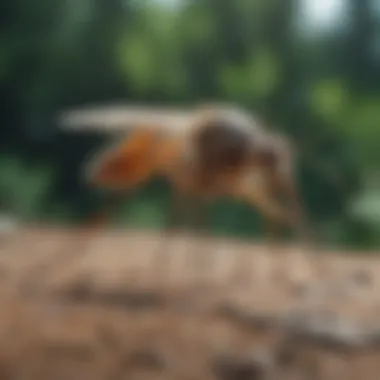
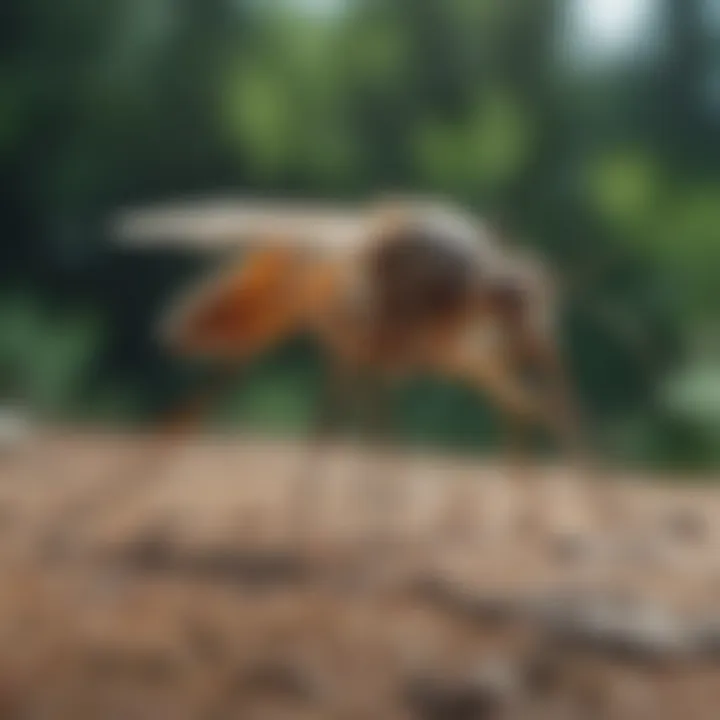
Both processes—the mosquito's saliva triggering your immune reaction and subsequent histamine release—form a chain of events that prepares the body to respond swiftly to perceived threats. Understanding these mechanisms allows health professionals, wellness coaches, and individuals alike to appreciate why specific treatments may soothe itching more effectively than others, providing a useful framework for future discussions on relief options.
Immediate Relief Techniques
In the midst of mosquito season, battling the incessant itching that follows a bite can be a rather cumbersome experience. Immediate relief techniques emerge as the first line of defense against this discomfort. Knowing how to tackle these annoying situations with swiftness can greatly enhance one’s overall comfort and well-being. Applying an effective remedy right after a bite can help avert prolonged suffering and minimize swelling. Let’s delve into various methods that can provide quick comfort from those pesky bites.
Cold Compress Applications
A cold compress is one of the simplest and quickest methods to soothe itching. By applying a cool compress to the affected area, you can constrict blood vessels and numb the region, reducing inflammation and irritation almost instantly.
To implement this technique, just grab a clean cloth and soak it in cold water or use an ice pack wrapped in a towel. Press it gently against the bite for about 10 to 15 minutes. It's not fancy, but when it comes to relief, it works wonders. Not only does it alleviate itching, it also helps with any swelling that may have occurred. Cold compresses are also easy on the wallet and can be done with items already in your home.
Over-the-Counter Treatments
There’s a whole array of over-the-counter products that can bring almost immediate relief from mosquito bites. Topical antihistamines, corticosteroid creams, and even calamine lotion make the list of options available. These products typically contain ingredients that work to counteract the allergic response triggered by the bite.
For instance, creams with hydrocortisone can reduce inflammation and calm the skin. On the other hand, antihistamine creams such as diphenhydramine can specifically target the itchiness. It’s very wise, though, to read instructions and remember that sometimes less is more. Applying too much doesn’t necessarily translate to better results.
Natural Remedies
Natural remedies have gained traction in recent years, becoming appealing choices for individuals seeking alternatives to pharmaceutical solutions. Here are three noteworthy options:
Aloe Vera
Aloe Vera is often lauded for its soothing properties, particularly when it comes to skin irritations. Its thick, gel-like substance provides a cooling effect on the skin and is known for helping to reduce inflammation. It’s a plant that’s been around forever but still holds its ground in the world of remedies. Applying Aloe Vera directly onto the bite can also prevent the area from drying out and promote healing.
Key characteristic: Its natural moisturizing properties make Aloe Vera a beneficial choice for soothing skin post-bite. While generally safe, it's wise to check for potential allergies before applying it extensively.
Tea Tree Oil
Tea Tree Oil is famed for its antiseptic properties. Widely regarded as a natural remedy, it can be effective against infections that may result from scratching mosquito bites. By diluting a few drops with a carrier oil and applying it to the affected area, the oil not only alleviates discomfort but can also help prevent further irritation.
Key characteristic: Its dual role as a pain reliever and antiseptic marks Tea Tree Oil as a popular option for this purpose. However, one must use it sparingly due to its potent nature—what’s more, certain skin types may react negatively.
Oatmeal Baths
An oatmeal bath offers an excellent, immersive experience for tackling itching caused by mosquito bites. Colloidal oatmeal, finely ground, acts as a skin protectant and can soothe irritation and itching. It’s particularly beneficial for those who feel multiple bites at once.
Key characteristic: Oatmeal is a gentle option, making it suitable for all skin types, including sensitive skin. You can add it directly to your bath or create a soothing paste for localized treatment. Just beware that while it’s soothing, it can be a bit messy!
In summary, immediate relief techniques play a vital role in managing the discomfort of mosquito bites. With a range of options from cold compresses to natural remedies, individuals can choose what works best for their needs. Whether through a quick application of a topical, a soothing cold pack, or an age-old remedy from the garden, there’s comfort to be found.
Long-Term Management Strategies
Addressing mosquito bites isn’t just about finding immediate relief but also about developing effective long-term management strategies. Understanding how to care for your skin and make dietary adjustments is essential. These strategies can help reduce the frequency and severity of bites, as well as the subsequent reactions. When one employs the right techniques, it can make all the difference in transforming a troublesome encounter into a manageable experience. This section dives into skin care regimens and dietary considerations, highlighting their significance in reducing overall irritation from bites.
Skin Care Regimens
Moisturizing
Moisturizing is a simple yet pivotal part of any long-term skin care regimen related to mosquito bites. A well-hydrated skin barrier minimizes the possibility of inflammation and irritability. One key characteristic of moisturizing is its ability to provide essential hydration which can strengthen the skin's defense system against allergens, including mosquito saliva. Regular application conveys a sense of comfort and preparedness in the event of a bite.
One significant aspect of moisturizing is that it can often contain added benefits, such as soothing ingredients like chamomile or aloe vera, which can calm itching. The unique feature of these products is their capacity to lock in moisture while delivering nutrients to the skin. However, one must note that not all moisturizers are created equal. Some might contain fragrances or other parabens that could aggravate sensitive skin further. Hence, it’s crucial to choose those specially formulated to be hypoallergenic or designed for sensitive skin.
Sunscreen Use
Sunscreen serves as another critical component in long-term skin care management. The interplay between sun exposure and mosquito activity is compelling. When skin burns or becomes irritated due to sun damage, it may react more violently to mosquito bites, leading to a heightened itching sensation. Sun protection minimizes the risk of damage, thereby providing your skin a better fighting chance against allergens.
A major characteristic of effective sunscreen is its ability to shield the skin from harmful UV rays while being breathable and non-comedogenic. This quality ensures that while the skin is protected, it doesn’t become suffocated by heavy creams. However, users should note that some sunscreen products employ chemical filters that could provoke skin sensitivity, so it’s wise to opt for natural options when possible. People often forget to reapply sunscreen after swimming or sweating, which can lead to compromised skin protection.
Dietary Considerations
Diet can play an underappreciated role in managing mosquito bite reactions. Certain foods have anti-inflammatory or antihistamine properties that can lessen the severity of allergic reactions. Incorporating fruits like mangoes or berries rich in antioxidants, or vegetables loaded with vitamins A and C, can bolster skin health and immune function.
Additionally, staying well-hydrated is critical. Water helps keep the skin elastic, which may help it recover faster from bites. On the flip side, individuals should be cautious with processed foods that could trigger inflammatory responses. Reducing sugar and trans fats in the diet can foster better skin health overall.
In summary, long-term management strategies focus on proactive skin care and mindful dietary choices. By creating a comprehensive plan that incorporates moisturizing, appropriate sun protection, and dietary adjustments, individuals can significantly mitigate the discomfort associated with mosquito bites.
Preventive Measures
Preventive measures play a pivotal role in combatting mosquito bites, making it essential to understand how to minimize exposure effectively. By implementing these strategies, one can significantly decrease the chances of acquiring those pesky bites that lead to itching and discomfort. The two fundamental categories of preventive measures are environmental control and personal protection strategies.
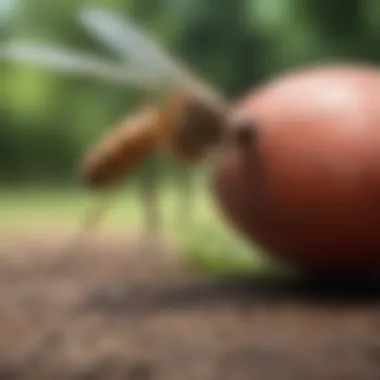
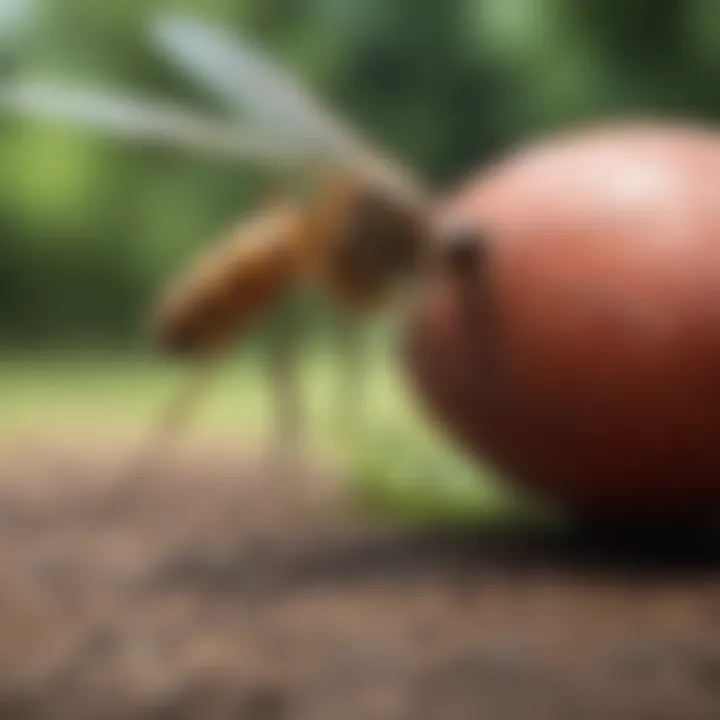
Environmental Control
Removing Standing Water
One of the most crucial aspects of removing standing water lies in its direct impact on mosquito breeding. Mosquitoes prefer to lay their eggs in calm, stagnant water sources. By consistently eliminating potential breeding sites around your home, such as bird baths, clogged gutters, or any containers that might collect rainwater, you can drastically reduce the mosquito population in your vicinity. The key characteristic of this method is its simplicity and cost-effectiveness, making it a popular choice for those looking to mitigate mosquito activity.
To further illustrate, just a few inches of water can offer enough environment for mosquitoes to thrive. Regularly inspecting and emptying containers holding water is a unique feature that stands out because it not only reduces mosquito numbers but also contributes positively to overall garden hygiene. The main advantages are clearly lowering the mosquito count, but a disadvantage could be that constant vigilance is necessary; without persistent action, the risk of re-breeding increases.
Using Mosquito Traps
Using mosquito traps represents an innovative strategy for banishing these insects from your space. These traps mimic the natural environment mosquitoes prefer, drawing them in with lures like carbon dioxide, heat, or UV light. The contributed benefit of such traps is that they target adult mosquitoes directly, helping to break their breeding cycle. They come in various forms, from electric traps to attractants, allowing for a flexible approach tailored to individual environments.
The key characteristic is their proactive nature, effectively reducing mosquito populations without relying on chemicals. This method is seen as beneficial for anyone wanting a pest control method that is more environmentally friendly. Plus, an advantage of traps is they can serve dual purposes; many models will also trap other nuisance insects. However, a disadvantage is that traps require maintenance and can be costlier upfront than traditional methods.
Personal Protection Strategies
Insect Repellents
Insect repellents are crucial in the arsenal against mosquito bites, forming a frontline defense when stepping outdoors. Their main function is to mask body odors that attract mosquitoes, thus reducing the chances of getting bitten. Popular repellents typically contain active ingredients such as DEET, picaridin, or oil of lemon eucalyptus, with varying degrees of effectiveness and duration. The versatility of these products makes them a go-to choice, as they can be easily applied to both skin and clothing.
A unique aspect of insect repellents is their ability to allow outdoor enjoyment while decreasing the likelihood of discomfort from mosquito bites. The advantages are clear: effective protection can enhance the experience of being outside, whether at a picnic or on a hike. However, possible drawbacks include potential skin irritation for some users, and the strong-smelling nature of several formulations can be off-putting as well.
Protective Clothing
Incorporating protective clothing into your routine can serve as a tangible barrier against mosquito bites. Clothing made from tightly woven fabrics can deter mosquitoes from penetrating while allowing ease of movement. Key characteristics include long sleeves, full-length pants, and light colors that are less attractive to mosquitoes, marking this approach as beneficial for outdoor enthusiasts.
An interesting aspect of protective clothing is that newer products often contain built-in insect repellents, showcasing advancements in fabric technology. The main advantage is the peace of mind that comes from an additional layer of defense, especially in areas known for high mosquito activity. Nevertheless, a downside is that protective clothing can be less breathable, making it uncomfortable in warmer climates.
"Taking proactive steps in both environmental control and personal protection can make a world of difference in minimizing mosquito bites and enjoying the outdoors without worry."
By understanding and employing these preventive measures, you can cultivate a mosquito-free environment that enhances outdoor activities while substantially lowering the risk of bites.
Understanding Mosquito Behavior
Understanding the behavior of mosquitoes is crucial for effectively managing and mitigating their bites. By learning about their habits, such as which times they are most active and what environments they prefer, one can better strategize methods of prevention and control. This knowledge not only aids in reducing exposure to these irritating pests but also contributes to more effective treatment and relief of the itchy sensations caused by bites. The intricate dance between mosquitoes and their ecosystems has implications for public health, personal comfort, and even pest control strategies.
Time and Habitat Preferences
Mosquitoes are creatures of habit. They tend to thrive in specific environmental conditions and display a notable preference for certain times of the day. Generally, many species of mosquitoes are most active during dawn and dusk. This period, often referred to as the twilight hours, provides optimal conditions for them to unleash their feeding frenzy. It is during these times that the insects tend to seek out soles that are unwittingly enjoying the twilight outdoor activities.
The types of habitats they prefer are equally telling. Stagnant water bodies, such as ponds, marshes, and even puddles, serve as breeding areas for mosquitoes. They reproduce in such environments, laying eggs that will eventually become the next generation of blood-seekers. In urban settings, neglected places like blocked gutters and flower pots can also become breeding grounds.
Identifying and managing these crucial habitats can significantly reduce the number of mosquitoes in an area, thus decreasing the likelihood of bites.
Attractiveness to Mosquitoes
Mosquitoes do not bite indiscriminately; they are attracted to various stimuli, and understanding these can aid in avoiding them.
Body Odor
Body odor is a significant factor in attracting mosquitoes. It's fascinating how unique human scents can be due to a combination of genetics, bacteria on the skin, the food one consumes, and even hormonal changes. For instance, people who sweat more tend to attract mosquitoes due to the lactic acid released in perspiration. Moreover, pregnant women and individuals with higher body temperatures are often found to be more attractive to these pests.
This characteristic can be exploited as a means of repelling mosquitoes. Certain essential oils, herbal lotions, and fragrant sprays can modify the natural scent, creating a less appealing aura for the mosquitoes. So, by being proactive and aware of one's own scent profile, individuals can take steps to make themselves less attractive.
Carbon Dioxide Emission
When people exhale, they release carbon dioxide, a gas that mosquitoes have evolved to detect over long distances. This gas acts like a beacon, signaling a potential meal source. The more active a person is—running, cycling or simply moving around—the more carbon dioxide they emit, thereby increasing attractiveness to mosquitoes.
This unique feature can be advantageous for understanding timing and protective measures. For example, individuals can plan outdoor activities for times when they are less likely to attract mosquitoes or choose environments where the carbon dioxide concentration is diluted due to ventilation.
"By recognizing the factors that attract mosquitoes, we can better equip ourselves to avoid bites and take action when the situation calls for it."
Allergies to Mosquito Bites
Understanding allergies to mosquito bites is crucial, as not all individuals react the same way to these pesky insects. While some may experience only mild itching or redness, others might face much more serious reactions. This section seeks to unpack the nature of allergic responses, why they happen, and what considerations should be taken into account for managing them.
Recognizing Severe Reactions
Severe allergic reactions to mosquito bites can manifest in various ways, making it important for individuals to be vigilant. Common indicators include significant swelling far beyond the bite site, hives or welts on other areas of the body, or even symptoms like difficulty breathing, dizziness, or a rapid heartbeat. These signals could hint at a condition known as anaphylaxis, which is life-threatening and demands immediate action.
In addition to these physical symptoms, it might help to remember that an allergic reaction is often accompanied by a sense of heightened awareness of the bite. It’s like the body is on high alert, triggering a response that is uncharacteristic for those who typically endure mosquito bites without any fuss. Key things to observe include:
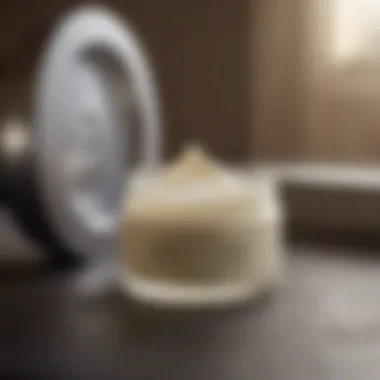
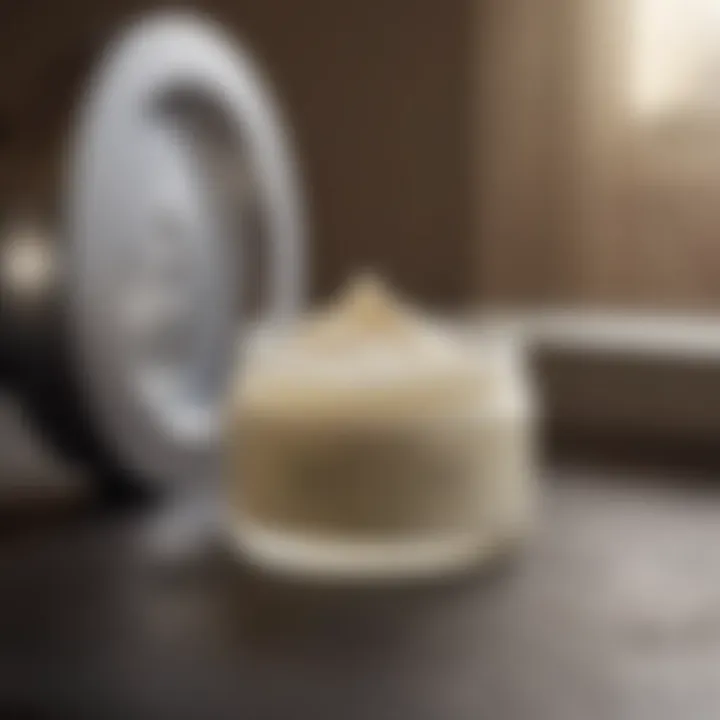
- Swelling: If the area around the bite swells considerably, it might suggest an allergic reaction.
- Wheezing or difficulty breathing: These symptoms should not be taken lightly and necessitate swift action.
- Fever: A raised body temperature, especially following a bite, could also hint at an exaggerated response.
If something feels off following a mosquito encounter, trust your instincts and avoid dismissing symptoms as mere nuisances.
When to Seek Medical Attention
Knowing when to reach out for medical help after a mosquito bite can be a life-saver—literally. If one finds themselves facing severe symptoms, it’s essential to act swiftly. The general rule of thumb is to err on the side of caution; if symptoms escalate rapidly or seem out of the ordinary, don’t delay in seeking professional insight.
A medical professional can conduct appropriate tests to determine whether the reaction is indeed an allergy or if it’s a different issue that mimics an allergic response. Here are some guidelines to consider:
- Immediate care: If there’s any sign of difficulty in breathing, call emergency services right away.
- Anaphylaxis history: Individuals who have a history of anaphylactic reactions should have an emergency plan in place, including access to an epinephrine auto-injector. Knowing how to use it can make all the difference.
- Follow-up appointments: Even if symptoms are controlled, it may be a good idea to consult with an allergist, especially if persistent reactions continue to arise.
- Documentation: Keeping a record of reactions and symptoms can be helpful for both the patient and healthcare providers during consultations.
As a reminder, taking mosquito bites seriously and understanding the potential for allergic reactions is not just wise; it’s vital for the well-being of you and others around you.
Cultural Perceptions and Practices
Understanding the cultural perceptions and practices surrounding mosquito bites offers valuable insights into how different societies cope with these nuisances. The ways people view these bites, along with the remedies they use, can reflect broader beliefs about nature and health. Traditional practices that are informed by cultural history can sometimes provide effective relief while enhancing a community's connection to its environment.
Cultural richness is often embedded in the local remedies that different regions adopt. For example, in many Asian cultures, herbal treatments are the go-to for managing the discomfort associated with mosquito bites. Additionally, rituals or communal practices aimed at warding off mosquitoes can be deeply ingrained in cultural traditions. By examining these elements, one sees that individuals are not just passive victims of mosquito bites but active participants in a long-standing dialogue with their environments.
Moreover, there is benefit in exploring these diverse approaches, as they can inspire new methods for managing bites that might have fallen under the radar in more modern, industrialized contexts. Integrating traditional knowledge into contemporary practices may yield innovative strategies to address both the itching and the ethical concerns surrounding many commercial solutions.
Traditional Remedies Around the World
Using traditional remedies can feel like stepping back in time, to when people relied on nature for healing. In many places, plants are revered for their healing properties.
- Turmeric Paste: In India, turmeric is mixed with water to form a paste. Traditionally, it's applied directly to bites due to its anti-inflammatory properties.
- Neem Leaves: Popular in Southeast Asia, neem leaves are either crushed to release their oil or brewed into a tea, which is then applied on the skin. This is believed to not only soothe but also repel mosquitoes.
- Lavender Oil: In parts of Europe, the calming scent of lavender oil isn't just for relaxation; it's also used to mitigate the itch. Besides providing relief, it’s known for its pleasant fragrance, making it a dual-purpose remedy.
- Basil: In countries like Thailand, crushed basil leaves are applied to bites. This is often embraced not only for its soothing qualities but also due to its accessibility in local gardens.
Exploring these remedies makes it evident that simplicity often renders effective results. It underscores a key element: nature was often the first pharmacy.
Myths and Misconceptions
Cultural narratives can get tangled in myths and misconceptions, particularly around topics as common as mosquito bites. Misinformation can lead to ineffective or even harmful practices.
- Myth: Only the female mosquito bites. While it’s true that only female mosquitoes bite, many still use this fact as an excuse to ignore mosquito prevention methods entirely. Being bit by males is not the only threat as they can still breed and propagate in the environment.
- Misconception: Mosquito bites cause immediate health issues. While bites can be annoying, many people mistakenly believe that every bite will result in a disease. It's important to note that the vast majority of bites do not lead to severe health problems.
- Myth: You can avoid mosquito bites with large amounts of sugar. Some cultures believe that eating lots of sweets makes you less attractive to mosquitoes. However, there's no scientific support for this claim; mosquitoes are attracted to other factors like carbon dioxide and body heat.
"It's crucial to differentiate between cultural beliefs and scientific facts when discussing issues related to health and well-being."
Because cultural perceptions are often poorly understood, providing clear and scientific insight becomes essential in dispelling these myths. Doing so not only informs the public but deserves to encourage a more proactive and informed approach to mosquito management on a personal and societal level.
Technological Advancements in Mosquito Control
Technological advancements in mosquito control are becoming increasingly crucial for tackling these pesky biters. As urban landscapes evolve and climate change shifts mosquito habitats, innovative strategies are necessary for effective management. This section delves into how these technologies work, their benefits, and why they are relevant in this ongoing battle against mosquitoes.
Innovations in Insect Repellents
The market for insect repellents has seen a surge in innovations tailored to combat mosquitoes specifically. New formulations aim to increase efficacy and reduce health risks associated with traditional chemical repellents.
- Microencapsulation Technology: This technique encases insect repellent compounds in tiny capsules, prolonging their effectiveness. It enables slow release, ensuring that protection lasts longer without frequent reapplications.
- Natural Repellent Innovations: Companies are exploring natural alternatives derived from essential oils, such as lemon eucalyptus and citronella. These products are gaining popularity, especially among environmentally conscious consumers. They promise to repel mosquitoes while being less harsh on the skin.
- Wearable Devices: Newfangled insect-repelling bracelets or patches are hitting the shelves. These devices emit repellent chemicals at a low concentration but have been reported to offer significant protection against bites. While some evidence suggests their effectiveness, further studies are necessary.
With these innovations, consumers have better options available to them, allowing for tailored solutions that align with their preferences regarding efficacy and safety.
Biotechnology in Mosquito Management
Biotechnology provides fresh pathways to control mosquito populations at their source. Genetic engineering and biocontrol methods are at the forefront of these efforts, offering smarter solutions than conventional insecticides.
- Genetically Modified Mosquitoes: Organizations have developed genetically modified (GM) mosquitoes that either produce male offspring incapable of reproducing or have a lifespan shorter than normal. The idea is to release these GM mosquitoes into the wild to drastically reduce mosquito populations over time.
- Wolbachia Bacteria: Introducing the Wolbachia bacteria into mosquito populations has gained traction. This natural bacterium disrupts the reproductive abilities of mosquitoes, leading to population decline. Ongoing trials show promise in various regions where these methods have been implemented effectively.
- Sterile Insect Technique (SIT): This involves releasing sterilized male mosquitoes into the wild in a bid to mate with females who then produce no viable eggs. This method has been used successfully in some areas, providing a sustainable approach to control populations without chemical involvement.
These biotechnological methods highlight a broader shift in thinking about mosquito control, moving toward ecologically sound practices that do not compromise public health.
By leveraging technology and biotechnology, we can navigate a future where mosquito bites don't have to be a bothersome aspect of outdoor activities.
Overall, these advancements serve as a beacon of hope against mosquito-borne diseases and the discomfort of bites. As research progresses, a more harmonious coexistence with nature and less irritation from these insects may soon be a reality.
The End and Final Thoughts
In wrapping up the discussion about mosquito bites, it’s important to recognize how such a seemingly minor issue can significantly impact daily life. The incessant itch that follows a bite isn’t just a nuisance; it can distract individuals from their activities, lead to scratching, and in some instances, even result in secondary infections. By thoroughly understanding the biological mechanisms behind mosquito bites, one can not only relieve discomfort but also take informed preventive measures to safeguard against them.
Recapitulating Key Points
As we’ve explored in this article, the journey of understanding and managing mosquito bites involves several critical pieces:
- Biological Mechanisms: We delved into how the saliva of mosquitoes triggers the itching sensation. Understanding this helps in grasping why some people react more severely than others.
- Immediate and Long-Term Relief: Both instant relief techniques and strategies for long-term management are available. Cold compresses can provide quick relief, while a consistent skin care regimen may lessen future reactions.
- Preventive Measures: Addressing environmental factors, using insect repellents, and implementing personal protection strategies can significantly reduce the likelihood of being bitten.
Considering these elements not only prepares individuals for immediate discomfort but empowers them to take control of their environment and health proactively.
Empowering Personal Choices
As we conclude, let’s emphasize the importance of making informed decisions regarding mosquito bite management. Selecting the right products and practices can have a lasting impact on one’s comfort and well-being. Here are a few actionable steps:
- Choose the Right Repellent: Familiarity with different options, like DEET or natural alternatives like citronella, can guide one toward a more personal fit based on their preferences and needs.
- Develop a Skin Care Routine: Regular moisturizing and sun protection can fortify the skin's barrier, making it less prone to irritation when bites occur.
- Stay Informed: Keeping abreast of technological advancements in mosquito control allows individuals to make better choices concerning their surroundings.
Ultimately, the journey of overcoming mosquito bite irritation is one of resilience and proactive care. With the information gleaned from this article, individuals can rightly equip themselves to manage and potentially reduce the impacts of these irritating bites on their lives.







